Business Ethics Reflective Essay: Decision Making, Theories, Morality
VerifiedAdded on 2023/06/09
|12
|4467
|167
Essay
AI Summary
This essay provides a reflective overview of business ethics, exploring ethical decision-making, moral theories, and the importance of personal values in professional settings. It delves into theories such as Utilitarianism, Deontological Ethics, and Altruism, examining their practical applications in business. The essay also discusses the impact theory of morality, emphasizing the alignment of personal and organizational ethics. It highlights the significance of ethical principles in balancing personal and professional life, fostering a culture of respect, equality, and fairness within organizations. The reflection underscores the role of ethics in shaping strong character, influencing behavior, and promoting overall development in both professional and personal spheres. Desklib offers similar essays and resources for students.
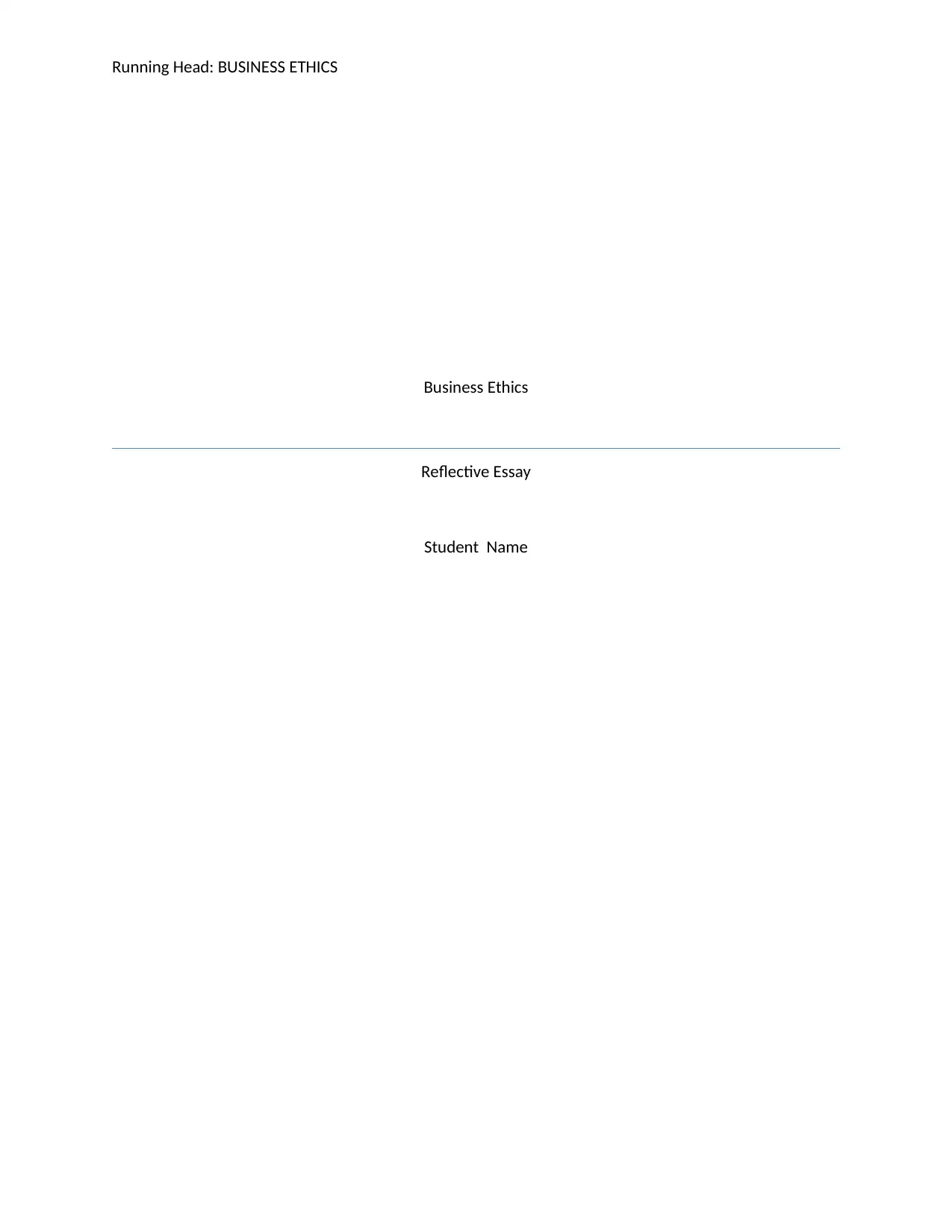
Running Head: BUSINESS ETHICS
Business Ethics
Reflective Essay
Student Name
Business Ethics
Reflective Essay
Student Name
Paraphrase This Document
Need a fresh take? Get an instant paraphrase of this document with our AI Paraphraser
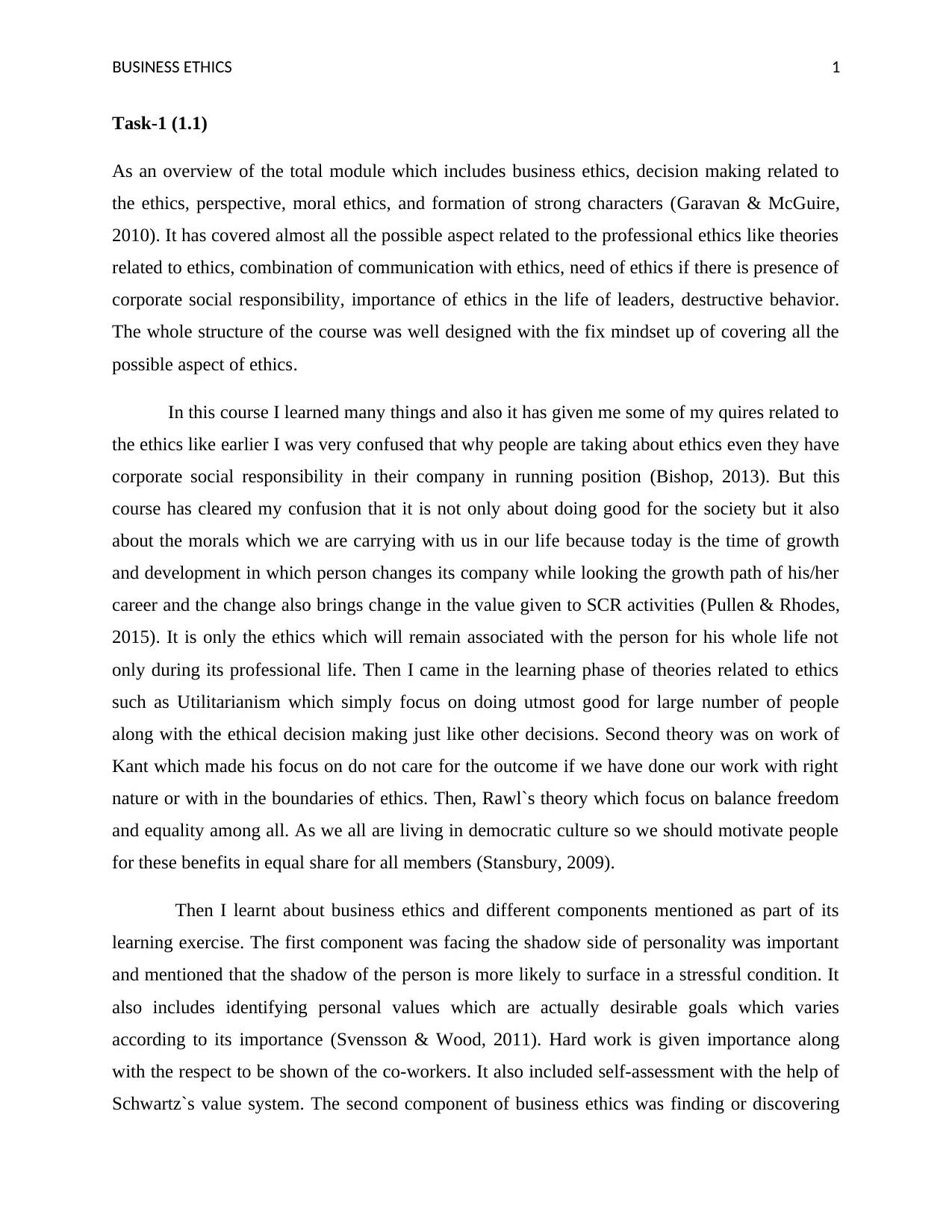
BUSINESS ETHICS 1
Task-1 (1.1)
As an overview of the total module which includes business ethics, decision making related to
the ethics, perspective, moral ethics, and formation of strong characters (Garavan & McGuire,
2010). It has covered almost all the possible aspect related to the professional ethics like theories
related to ethics, combination of communication with ethics, need of ethics if there is presence of
corporate social responsibility, importance of ethics in the life of leaders, destructive behavior.
The whole structure of the course was well designed with the fix mindset up of covering all the
possible aspect of ethics.
In this course I learned many things and also it has given me some of my quires related to
the ethics like earlier I was very confused that why people are taking about ethics even they have
corporate social responsibility in their company in running position (Bishop, 2013). But this
course has cleared my confusion that it is not only about doing good for the society but it also
about the morals which we are carrying with us in our life because today is the time of growth
and development in which person changes its company while looking the growth path of his/her
career and the change also brings change in the value given to SCR activities (Pullen & Rhodes,
2015). It is only the ethics which will remain associated with the person for his whole life not
only during its professional life. Then I came in the learning phase of theories related to ethics
such as Utilitarianism which simply focus on doing utmost good for large number of people
along with the ethical decision making just like other decisions. Second theory was on work of
Kant which made his focus on do not care for the outcome if we have done our work with right
nature or with in the boundaries of ethics. Then, Rawl`s theory which focus on balance freedom
and equality among all. As we all are living in democratic culture so we should motivate people
for these benefits in equal share for all members (Stansbury, 2009).
Then I learnt about business ethics and different components mentioned as part of its
learning exercise. The first component was facing the shadow side of personality was important
and mentioned that the shadow of the person is more likely to surface in a stressful condition. It
also includes identifying personal values which are actually desirable goals which varies
according to its importance (Svensson & Wood, 2011). Hard work is given importance along
with the respect to be shown of the co-workers. It also included self-assessment with the help of
Schwartz`s value system. The second component of business ethics was finding or discovering
Task-1 (1.1)
As an overview of the total module which includes business ethics, decision making related to
the ethics, perspective, moral ethics, and formation of strong characters (Garavan & McGuire,
2010). It has covered almost all the possible aspect related to the professional ethics like theories
related to ethics, combination of communication with ethics, need of ethics if there is presence of
corporate social responsibility, importance of ethics in the life of leaders, destructive behavior.
The whole structure of the course was well designed with the fix mindset up of covering all the
possible aspect of ethics.
In this course I learned many things and also it has given me some of my quires related to
the ethics like earlier I was very confused that why people are taking about ethics even they have
corporate social responsibility in their company in running position (Bishop, 2013). But this
course has cleared my confusion that it is not only about doing good for the society but it also
about the morals which we are carrying with us in our life because today is the time of growth
and development in which person changes its company while looking the growth path of his/her
career and the change also brings change in the value given to SCR activities (Pullen & Rhodes,
2015). It is only the ethics which will remain associated with the person for his whole life not
only during its professional life. Then I came in the learning phase of theories related to ethics
such as Utilitarianism which simply focus on doing utmost good for large number of people
along with the ethical decision making just like other decisions. Second theory was on work of
Kant which made his focus on do not care for the outcome if we have done our work with right
nature or with in the boundaries of ethics. Then, Rawl`s theory which focus on balance freedom
and equality among all. As we all are living in democratic culture so we should motivate people
for these benefits in equal share for all members (Stansbury, 2009).
Then I learnt about business ethics and different components mentioned as part of its
learning exercise. The first component was facing the shadow side of personality was important
and mentioned that the shadow of the person is more likely to surface in a stressful condition. It
also includes identifying personal values which are actually desirable goals which varies
according to its importance (Svensson & Wood, 2011). Hard work is given importance along
with the respect to be shown of the co-workers. It also included self-assessment with the help of
Schwartz`s value system. The second component of business ethics was finding or discovering
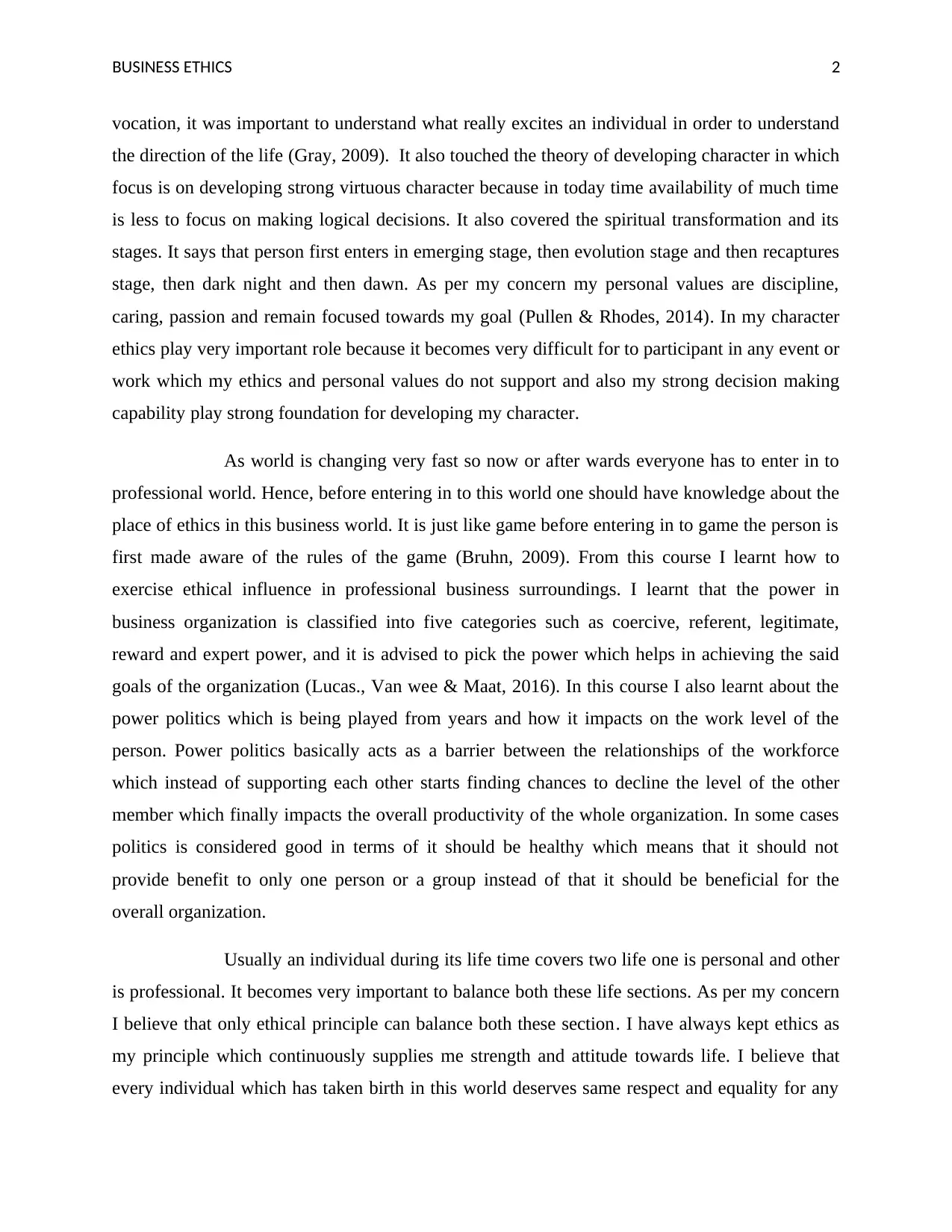
BUSINESS ETHICS 2
vocation, it was important to understand what really excites an individual in order to understand
the direction of the life (Gray, 2009). It also touched the theory of developing character in which
focus is on developing strong virtuous character because in today time availability of much time
is less to focus on making logical decisions. It also covered the spiritual transformation and its
stages. It says that person first enters in emerging stage, then evolution stage and then recaptures
stage, then dark night and then dawn. As per my concern my personal values are discipline,
caring, passion and remain focused towards my goal (Pullen & Rhodes, 2014). In my character
ethics play very important role because it becomes very difficult for to participant in any event or
work which my ethics and personal values do not support and also my strong decision making
capability play strong foundation for developing my character.
As world is changing very fast so now or after wards everyone has to enter in to
professional world. Hence, before entering in to this world one should have knowledge about the
place of ethics in this business world. It is just like game before entering in to game the person is
first made aware of the rules of the game (Bruhn, 2009). From this course I learnt how to
exercise ethical influence in professional business surroundings. I learnt that the power in
business organization is classified into five categories such as coercive, referent, legitimate,
reward and expert power, and it is advised to pick the power which helps in achieving the said
goals of the organization (Lucas., Van wee & Maat, 2016). In this course I also learnt about the
power politics which is being played from years and how it impacts on the work level of the
person. Power politics basically acts as a barrier between the relationships of the workforce
which instead of supporting each other starts finding chances to decline the level of the other
member which finally impacts the overall productivity of the whole organization. In some cases
politics is considered good in terms of it should be healthy which means that it should not
provide benefit to only one person or a group instead of that it should be beneficial for the
overall organization.
Usually an individual during its life time covers two life one is personal and other
is professional. It becomes very important to balance both these life sections. As per my concern
I believe that only ethical principle can balance both these section. I have always kept ethics as
my principle which continuously supplies me strength and attitude towards life. I believe that
every individual which has taken birth in this world deserves same respect and equality for any
vocation, it was important to understand what really excites an individual in order to understand
the direction of the life (Gray, 2009). It also touched the theory of developing character in which
focus is on developing strong virtuous character because in today time availability of much time
is less to focus on making logical decisions. It also covered the spiritual transformation and its
stages. It says that person first enters in emerging stage, then evolution stage and then recaptures
stage, then dark night and then dawn. As per my concern my personal values are discipline,
caring, passion and remain focused towards my goal (Pullen & Rhodes, 2014). In my character
ethics play very important role because it becomes very difficult for to participant in any event or
work which my ethics and personal values do not support and also my strong decision making
capability play strong foundation for developing my character.
As world is changing very fast so now or after wards everyone has to enter in to
professional world. Hence, before entering in to this world one should have knowledge about the
place of ethics in this business world. It is just like game before entering in to game the person is
first made aware of the rules of the game (Bruhn, 2009). From this course I learnt how to
exercise ethical influence in professional business surroundings. I learnt that the power in
business organization is classified into five categories such as coercive, referent, legitimate,
reward and expert power, and it is advised to pick the power which helps in achieving the said
goals of the organization (Lucas., Van wee & Maat, 2016). In this course I also learnt about the
power politics which is being played from years and how it impacts on the work level of the
person. Power politics basically acts as a barrier between the relationships of the workforce
which instead of supporting each other starts finding chances to decline the level of the other
member which finally impacts the overall productivity of the whole organization. In some cases
politics is considered good in terms of it should be healthy which means that it should not
provide benefit to only one person or a group instead of that it should be beneficial for the
overall organization.
Usually an individual during its life time covers two life one is personal and other
is professional. It becomes very important to balance both these life sections. As per my concern
I believe that only ethical principle can balance both these section. I have always kept ethics as
my principle which continuously supplies me strength and attitude towards life. I believe that
every individual which has taken birth in this world deserves same respect and equality for any
⊘ This is a preview!⊘
Do you want full access?
Subscribe today to unlock all pages.

Trusted by 1+ million students worldwide
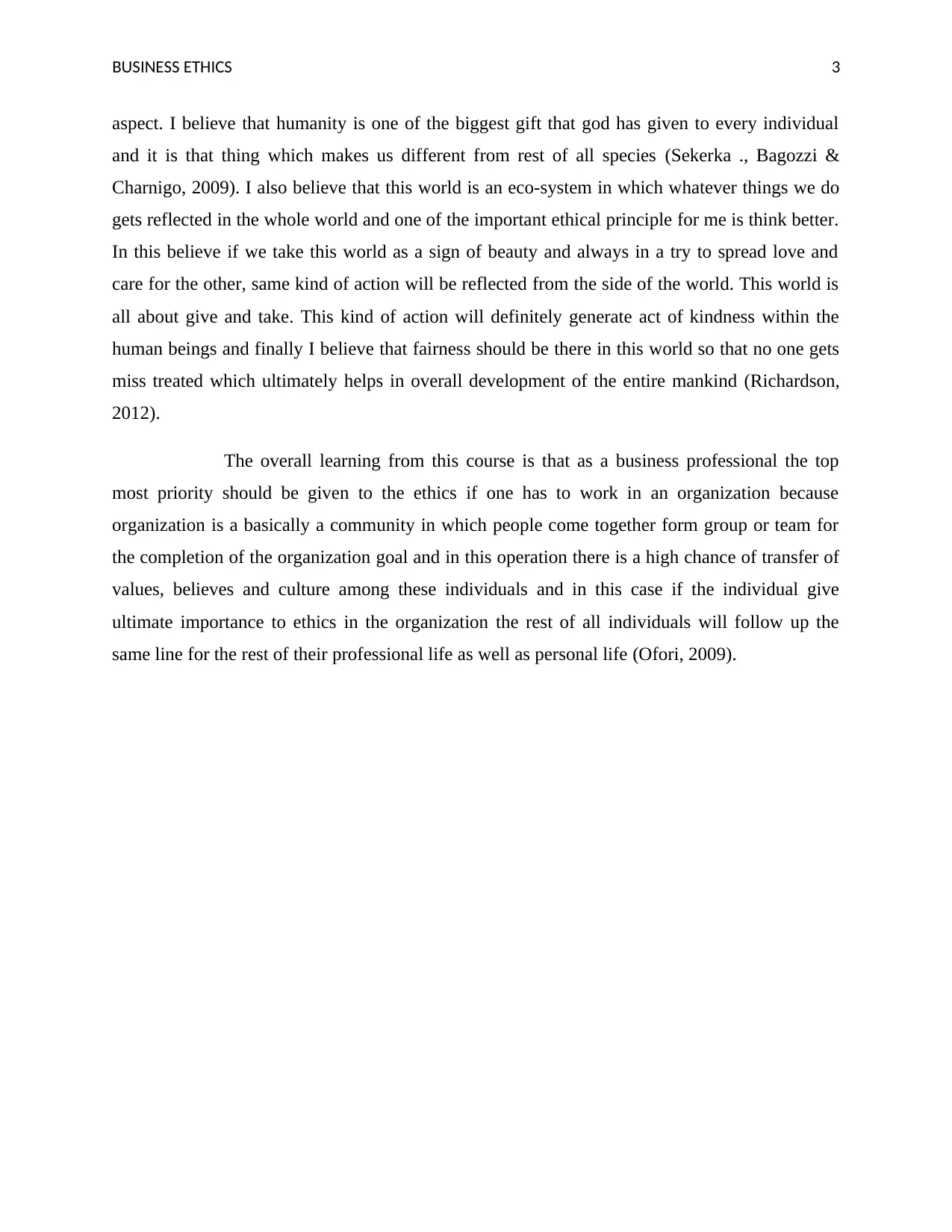
BUSINESS ETHICS 3
aspect. I believe that humanity is one of the biggest gift that god has given to every individual
and it is that thing which makes us different from rest of all species (Sekerka ., Bagozzi &
Charnigo, 2009). I also believe that this world is an eco-system in which whatever things we do
gets reflected in the whole world and one of the important ethical principle for me is think better.
In this believe if we take this world as a sign of beauty and always in a try to spread love and
care for the other, same kind of action will be reflected from the side of the world. This world is
all about give and take. This kind of action will definitely generate act of kindness within the
human beings and finally I believe that fairness should be there in this world so that no one gets
miss treated which ultimately helps in overall development of the entire mankind (Richardson,
2012).
The overall learning from this course is that as a business professional the top
most priority should be given to the ethics if one has to work in an organization because
organization is a basically a community in which people come together form group or team for
the completion of the organization goal and in this operation there is a high chance of transfer of
values, believes and culture among these individuals and in this case if the individual give
ultimate importance to ethics in the organization the rest of all individuals will follow up the
same line for the rest of their professional life as well as personal life (Ofori, 2009).
aspect. I believe that humanity is one of the biggest gift that god has given to every individual
and it is that thing which makes us different from rest of all species (Sekerka ., Bagozzi &
Charnigo, 2009). I also believe that this world is an eco-system in which whatever things we do
gets reflected in the whole world and one of the important ethical principle for me is think better.
In this believe if we take this world as a sign of beauty and always in a try to spread love and
care for the other, same kind of action will be reflected from the side of the world. This world is
all about give and take. This kind of action will definitely generate act of kindness within the
human beings and finally I believe that fairness should be there in this world so that no one gets
miss treated which ultimately helps in overall development of the entire mankind (Richardson,
2012).
The overall learning from this course is that as a business professional the top
most priority should be given to the ethics if one has to work in an organization because
organization is a basically a community in which people come together form group or team for
the completion of the organization goal and in this operation there is a high chance of transfer of
values, believes and culture among these individuals and in this case if the individual give
ultimate importance to ethics in the organization the rest of all individuals will follow up the
same line for the rest of their professional life as well as personal life (Ofori, 2009).
Paraphrase This Document
Need a fresh take? Get an instant paraphrase of this document with our AI Paraphraser
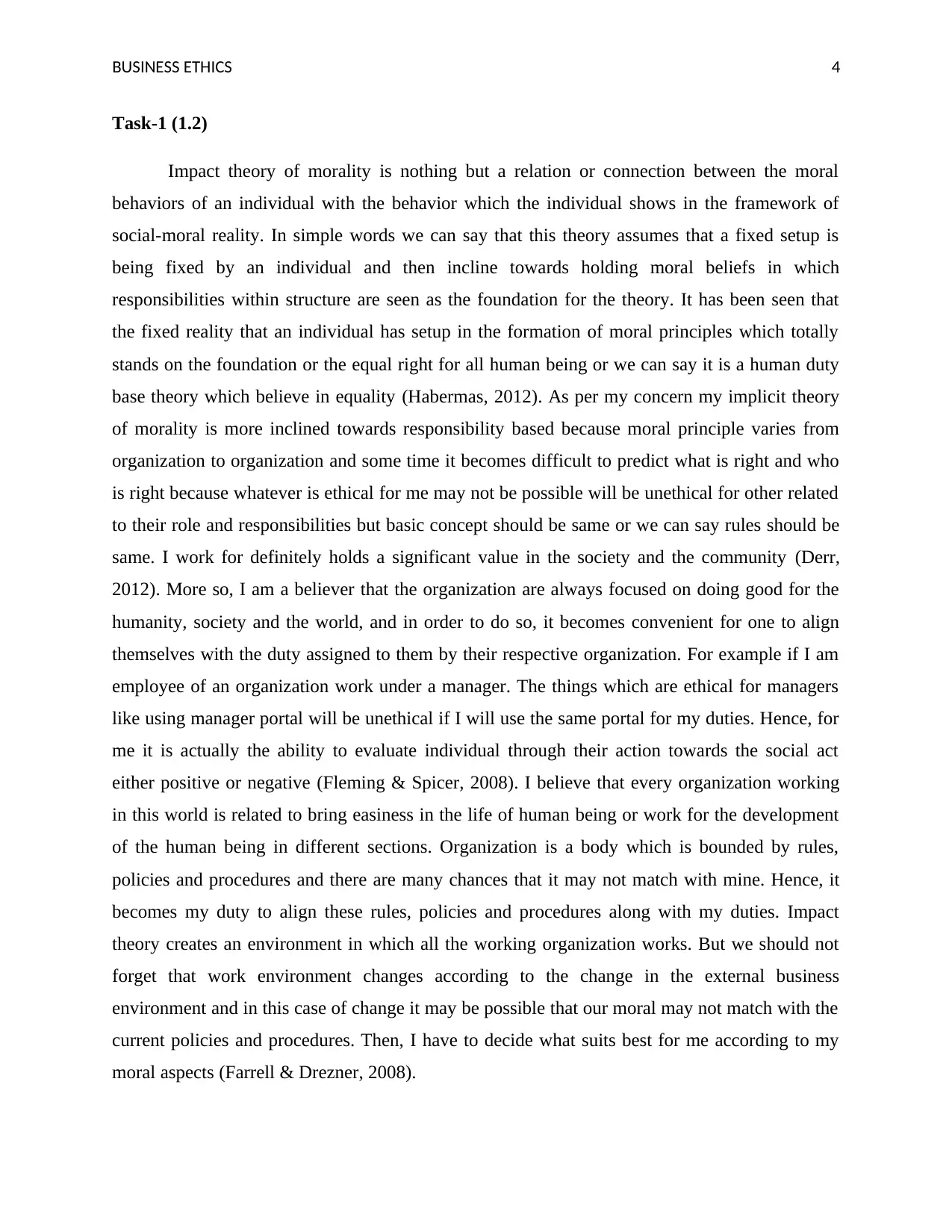
BUSINESS ETHICS 4
Task-1 (1.2)
Impact theory of morality is nothing but a relation or connection between the moral
behaviors of an individual with the behavior which the individual shows in the framework of
social-moral reality. In simple words we can say that this theory assumes that a fixed setup is
being fixed by an individual and then incline towards holding moral beliefs in which
responsibilities within structure are seen as the foundation for the theory. It has been seen that
the fixed reality that an individual has setup in the formation of moral principles which totally
stands on the foundation or the equal right for all human being or we can say it is a human duty
base theory which believe in equality (Habermas, 2012). As per my concern my implicit theory
of morality is more inclined towards responsibility based because moral principle varies from
organization to organization and some time it becomes difficult to predict what is right and who
is right because whatever is ethical for me may not be possible will be unethical for other related
to their role and responsibilities but basic concept should be same or we can say rules should be
same. I work for definitely holds a significant value in the society and the community (Derr,
2012). More so, I am a believer that the organization are always focused on doing good for the
humanity, society and the world, and in order to do so, it becomes convenient for one to align
themselves with the duty assigned to them by their respective organization. For example if I am
employee of an organization work under a manager. The things which are ethical for managers
like using manager portal will be unethical if I will use the same portal for my duties. Hence, for
me it is actually the ability to evaluate individual through their action towards the social act
either positive or negative (Fleming & Spicer, 2008). I believe that every organization working
in this world is related to bring easiness in the life of human being or work for the development
of the human being in different sections. Organization is a body which is bounded by rules,
policies and procedures and there are many chances that it may not match with mine. Hence, it
becomes my duty to align these rules, policies and procedures along with my duties. Impact
theory creates an environment in which all the working organization works. But we should not
forget that work environment changes according to the change in the external business
environment and in this case of change it may be possible that our moral may not match with the
current policies and procedures. Then, I have to decide what suits best for me according to my
moral aspects (Farrell & Drezner, 2008).
Task-1 (1.2)
Impact theory of morality is nothing but a relation or connection between the moral
behaviors of an individual with the behavior which the individual shows in the framework of
social-moral reality. In simple words we can say that this theory assumes that a fixed setup is
being fixed by an individual and then incline towards holding moral beliefs in which
responsibilities within structure are seen as the foundation for the theory. It has been seen that
the fixed reality that an individual has setup in the formation of moral principles which totally
stands on the foundation or the equal right for all human being or we can say it is a human duty
base theory which believe in equality (Habermas, 2012). As per my concern my implicit theory
of morality is more inclined towards responsibility based because moral principle varies from
organization to organization and some time it becomes difficult to predict what is right and who
is right because whatever is ethical for me may not be possible will be unethical for other related
to their role and responsibilities but basic concept should be same or we can say rules should be
same. I work for definitely holds a significant value in the society and the community (Derr,
2012). More so, I am a believer that the organization are always focused on doing good for the
humanity, society and the world, and in order to do so, it becomes convenient for one to align
themselves with the duty assigned to them by their respective organization. For example if I am
employee of an organization work under a manager. The things which are ethical for managers
like using manager portal will be unethical if I will use the same portal for my duties. Hence, for
me it is actually the ability to evaluate individual through their action towards the social act
either positive or negative (Fleming & Spicer, 2008). I believe that every organization working
in this world is related to bring easiness in the life of human being or work for the development
of the human being in different sections. Organization is a body which is bounded by rules,
policies and procedures and there are many chances that it may not match with mine. Hence, it
becomes my duty to align these rules, policies and procedures along with my duties. Impact
theory creates an environment in which all the working organization works. But we should not
forget that work environment changes according to the change in the external business
environment and in this case of change it may be possible that our moral may not match with the
current policies and procedures. Then, I have to decide what suits best for me according to my
moral aspects (Farrell & Drezner, 2008).
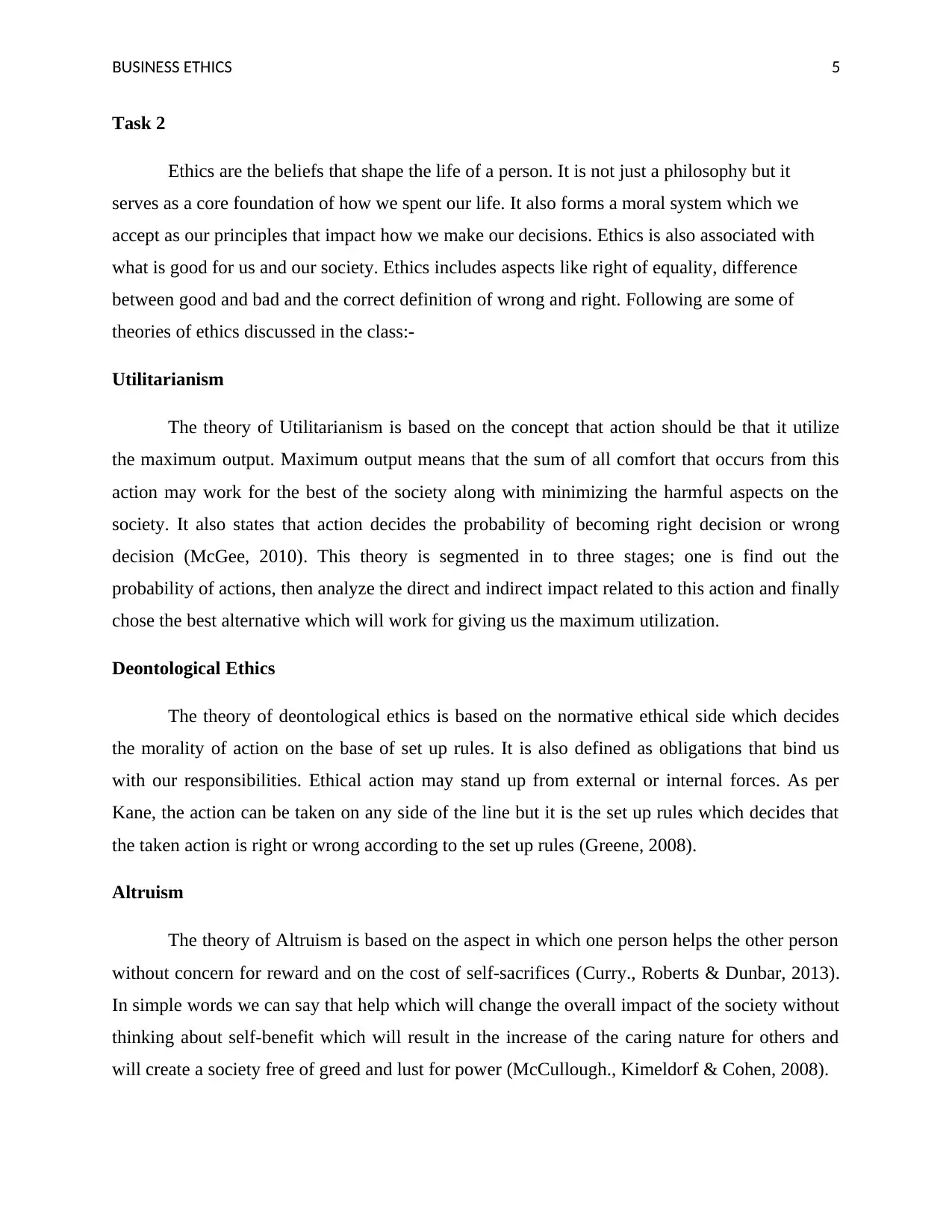
BUSINESS ETHICS 5
Task 2
Ethics are the beliefs that shape the life of a person. It is not just a philosophy but it
serves as a core foundation of how we spent our life. It also forms a moral system which we
accept as our principles that impact how we make our decisions. Ethics is also associated with
what is good for us and our society. Ethics includes aspects like right of equality, difference
between good and bad and the correct definition of wrong and right. Following are some of
theories of ethics discussed in the class:-
Utilitarianism
The theory of Utilitarianism is based on the concept that action should be that it utilize
the maximum output. Maximum output means that the sum of all comfort that occurs from this
action may work for the best of the society along with minimizing the harmful aspects on the
society. It also states that action decides the probability of becoming right decision or wrong
decision (McGee, 2010). This theory is segmented in to three stages; one is find out the
probability of actions, then analyze the direct and indirect impact related to this action and finally
chose the best alternative which will work for giving us the maximum utilization.
Deontological Ethics
The theory of deontological ethics is based on the normative ethical side which decides
the morality of action on the base of set up rules. It is also defined as obligations that bind us
with our responsibilities. Ethical action may stand up from external or internal forces. As per
Kane, the action can be taken on any side of the line but it is the set up rules which decides that
the taken action is right or wrong according to the set up rules (Greene, 2008).
Altruism
The theory of Altruism is based on the aspect in which one person helps the other person
without concern for reward and on the cost of self-sacrifices (Curry., Roberts & Dunbar, 2013).
In simple words we can say that help which will change the overall impact of the society without
thinking about self-benefit which will result in the increase of the caring nature for others and
will create a society free of greed and lust for power (McCullough., Kimeldorf & Cohen, 2008).
Task 2
Ethics are the beliefs that shape the life of a person. It is not just a philosophy but it
serves as a core foundation of how we spent our life. It also forms a moral system which we
accept as our principles that impact how we make our decisions. Ethics is also associated with
what is good for us and our society. Ethics includes aspects like right of equality, difference
between good and bad and the correct definition of wrong and right. Following are some of
theories of ethics discussed in the class:-
Utilitarianism
The theory of Utilitarianism is based on the concept that action should be that it utilize
the maximum output. Maximum output means that the sum of all comfort that occurs from this
action may work for the best of the society along with minimizing the harmful aspects on the
society. It also states that action decides the probability of becoming right decision or wrong
decision (McGee, 2010). This theory is segmented in to three stages; one is find out the
probability of actions, then analyze the direct and indirect impact related to this action and finally
chose the best alternative which will work for giving us the maximum utilization.
Deontological Ethics
The theory of deontological ethics is based on the normative ethical side which decides
the morality of action on the base of set up rules. It is also defined as obligations that bind us
with our responsibilities. Ethical action may stand up from external or internal forces. As per
Kane, the action can be taken on any side of the line but it is the set up rules which decides that
the taken action is right or wrong according to the set up rules (Greene, 2008).
Altruism
The theory of Altruism is based on the aspect in which one person helps the other person
without concern for reward and on the cost of self-sacrifices (Curry., Roberts & Dunbar, 2013).
In simple words we can say that help which will change the overall impact of the society without
thinking about self-benefit which will result in the increase of the caring nature for others and
will create a society free of greed and lust for power (McCullough., Kimeldorf & Cohen, 2008).
⊘ This is a preview!⊘
Do you want full access?
Subscribe today to unlock all pages.

Trusted by 1+ million students worldwide
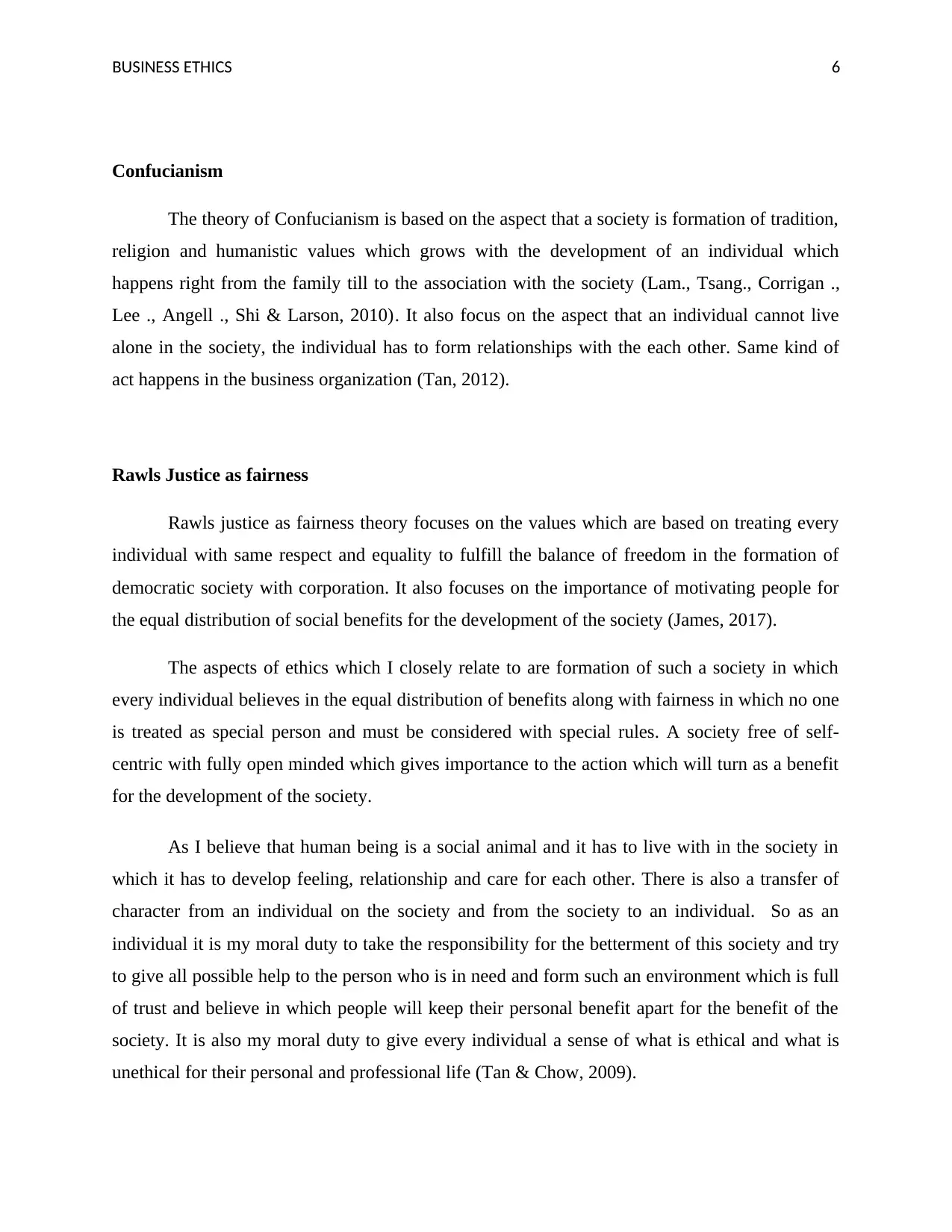
BUSINESS ETHICS 6
Confucianism
The theory of Confucianism is based on the aspect that a society is formation of tradition,
religion and humanistic values which grows with the development of an individual which
happens right from the family till to the association with the society (Lam., Tsang., Corrigan .,
Lee ., Angell ., Shi & Larson, 2010). It also focus on the aspect that an individual cannot live
alone in the society, the individual has to form relationships with the each other. Same kind of
act happens in the business organization (Tan, 2012).
Rawls Justice as fairness
Rawls justice as fairness theory focuses on the values which are based on treating every
individual with same respect and equality to fulfill the balance of freedom in the formation of
democratic society with corporation. It also focuses on the importance of motivating people for
the equal distribution of social benefits for the development of the society (James, 2017).
The aspects of ethics which I closely relate to are formation of such a society in which
every individual believes in the equal distribution of benefits along with fairness in which no one
is treated as special person and must be considered with special rules. A society free of self-
centric with fully open minded which gives importance to the action which will turn as a benefit
for the development of the society.
As I believe that human being is a social animal and it has to live with in the society in
which it has to develop feeling, relationship and care for each other. There is also a transfer of
character from an individual on the society and from the society to an individual. So as an
individual it is my moral duty to take the responsibility for the betterment of this society and try
to give all possible help to the person who is in need and form such an environment which is full
of trust and believe in which people will keep their personal benefit apart for the benefit of the
society. It is also my moral duty to give every individual a sense of what is ethical and what is
unethical for their personal and professional life (Tan & Chow, 2009).
Confucianism
The theory of Confucianism is based on the aspect that a society is formation of tradition,
religion and humanistic values which grows with the development of an individual which
happens right from the family till to the association with the society (Lam., Tsang., Corrigan .,
Lee ., Angell ., Shi & Larson, 2010). It also focus on the aspect that an individual cannot live
alone in the society, the individual has to form relationships with the each other. Same kind of
act happens in the business organization (Tan, 2012).
Rawls Justice as fairness
Rawls justice as fairness theory focuses on the values which are based on treating every
individual with same respect and equality to fulfill the balance of freedom in the formation of
democratic society with corporation. It also focuses on the importance of motivating people for
the equal distribution of social benefits for the development of the society (James, 2017).
The aspects of ethics which I closely relate to are formation of such a society in which
every individual believes in the equal distribution of benefits along with fairness in which no one
is treated as special person and must be considered with special rules. A society free of self-
centric with fully open minded which gives importance to the action which will turn as a benefit
for the development of the society.
As I believe that human being is a social animal and it has to live with in the society in
which it has to develop feeling, relationship and care for each other. There is also a transfer of
character from an individual on the society and from the society to an individual. So as an
individual it is my moral duty to take the responsibility for the betterment of this society and try
to give all possible help to the person who is in need and form such an environment which is full
of trust and believe in which people will keep their personal benefit apart for the benefit of the
society. It is also my moral duty to give every individual a sense of what is ethical and what is
unethical for their personal and professional life (Tan & Chow, 2009).
Paraphrase This Document
Need a fresh take? Get an instant paraphrase of this document with our AI Paraphraser
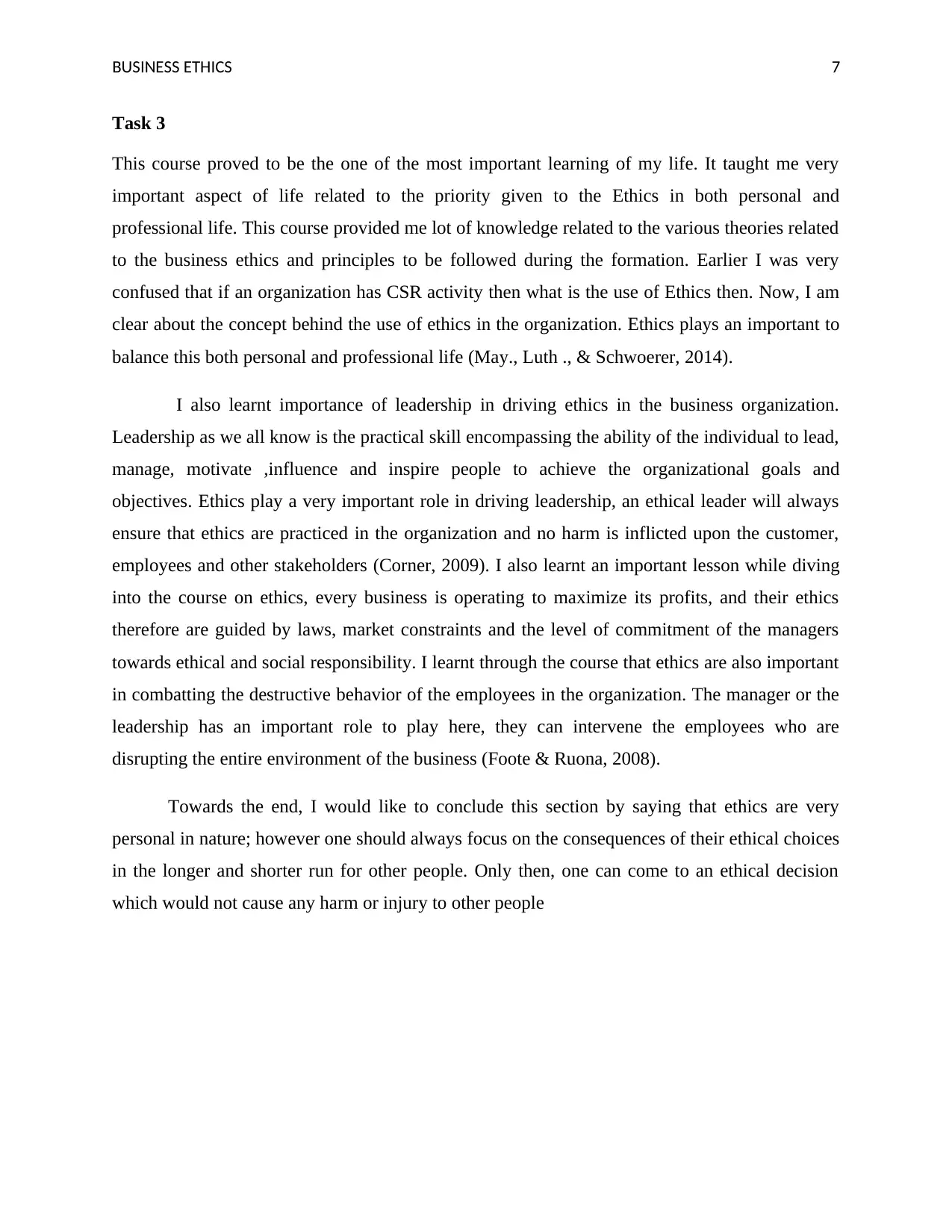
BUSINESS ETHICS 7
Task 3
This course proved to be the one of the most important learning of my life. It taught me very
important aspect of life related to the priority given to the Ethics in both personal and
professional life. This course provided me lot of knowledge related to the various theories related
to the business ethics and principles to be followed during the formation. Earlier I was very
confused that if an organization has CSR activity then what is the use of Ethics then. Now, I am
clear about the concept behind the use of ethics in the organization. Ethics plays an important to
balance this both personal and professional life (May., Luth ., & Schwoerer, 2014).
I also learnt importance of leadership in driving ethics in the business organization.
Leadership as we all know is the practical skill encompassing the ability of the individual to lead,
manage, motivate ,influence and inspire people to achieve the organizational goals and
objectives. Ethics play a very important role in driving leadership, an ethical leader will always
ensure that ethics are practiced in the organization and no harm is inflicted upon the customer,
employees and other stakeholders (Corner, 2009). I also learnt an important lesson while diving
into the course on ethics, every business is operating to maximize its profits, and their ethics
therefore are guided by laws, market constraints and the level of commitment of the managers
towards ethical and social responsibility. I learnt through the course that ethics are also important
in combatting the destructive behavior of the employees in the organization. The manager or the
leadership has an important role to play here, they can intervene the employees who are
disrupting the entire environment of the business (Foote & Ruona, 2008).
Towards the end, I would like to conclude this section by saying that ethics are very
personal in nature; however one should always focus on the consequences of their ethical choices
in the longer and shorter run for other people. Only then, one can come to an ethical decision
which would not cause any harm or injury to other people
Task 3
This course proved to be the one of the most important learning of my life. It taught me very
important aspect of life related to the priority given to the Ethics in both personal and
professional life. This course provided me lot of knowledge related to the various theories related
to the business ethics and principles to be followed during the formation. Earlier I was very
confused that if an organization has CSR activity then what is the use of Ethics then. Now, I am
clear about the concept behind the use of ethics in the organization. Ethics plays an important to
balance this both personal and professional life (May., Luth ., & Schwoerer, 2014).
I also learnt importance of leadership in driving ethics in the business organization.
Leadership as we all know is the practical skill encompassing the ability of the individual to lead,
manage, motivate ,influence and inspire people to achieve the organizational goals and
objectives. Ethics play a very important role in driving leadership, an ethical leader will always
ensure that ethics are practiced in the organization and no harm is inflicted upon the customer,
employees and other stakeholders (Corner, 2009). I also learnt an important lesson while diving
into the course on ethics, every business is operating to maximize its profits, and their ethics
therefore are guided by laws, market constraints and the level of commitment of the managers
towards ethical and social responsibility. I learnt through the course that ethics are also important
in combatting the destructive behavior of the employees in the organization. The manager or the
leadership has an important role to play here, they can intervene the employees who are
disrupting the entire environment of the business (Foote & Ruona, 2008).
Towards the end, I would like to conclude this section by saying that ethics are very
personal in nature; however one should always focus on the consequences of their ethical choices
in the longer and shorter run for other people. Only then, one can come to an ethical decision
which would not cause any harm or injury to other people
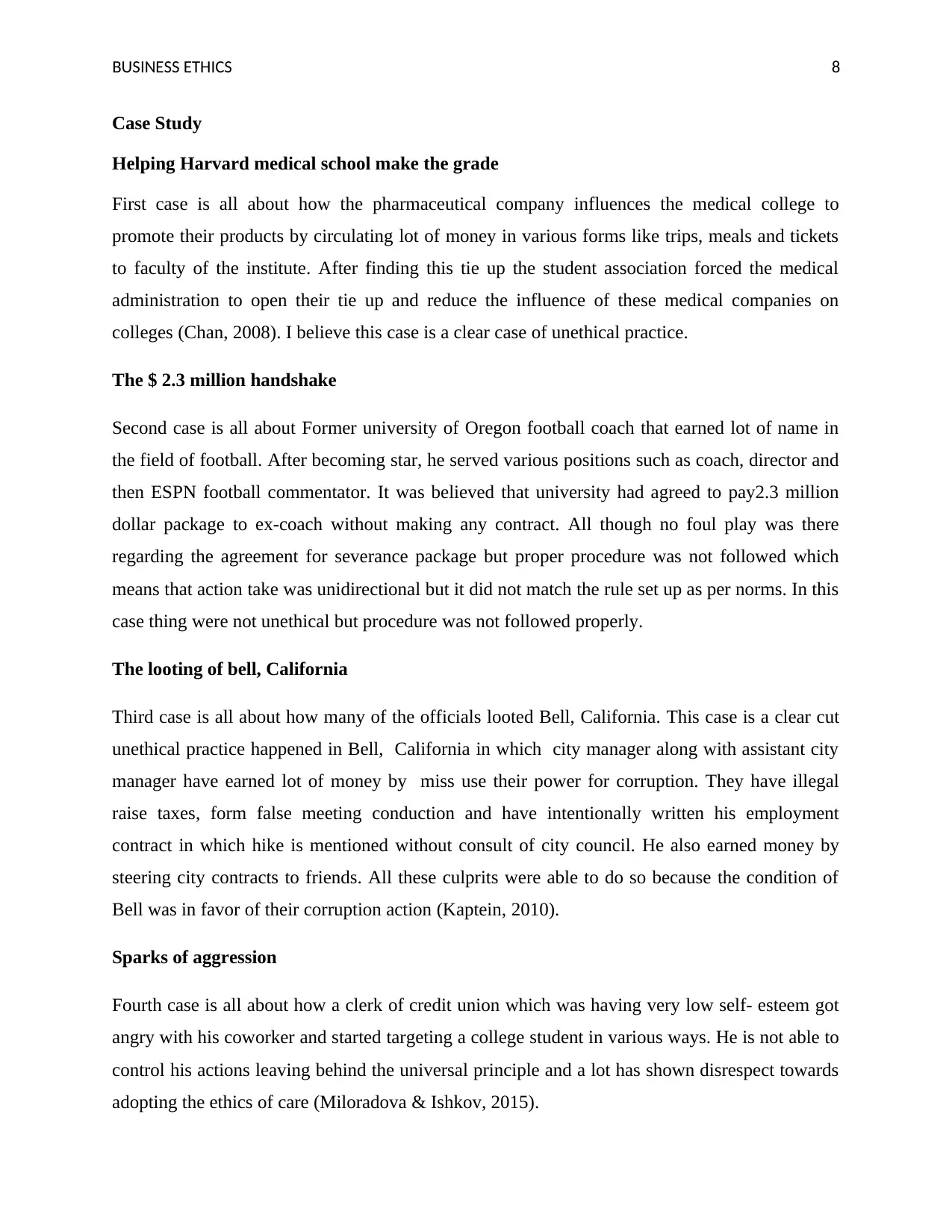
BUSINESS ETHICS 8
Case Study
Helping Harvard medical school make the grade
First case is all about how the pharmaceutical company influences the medical college to
promote their products by circulating lot of money in various forms like trips, meals and tickets
to faculty of the institute. After finding this tie up the student association forced the medical
administration to open their tie up and reduce the influence of these medical companies on
colleges (Chan, 2008). I believe this case is a clear case of unethical practice.
The $ 2.3 million handshake
Second case is all about Former university of Oregon football coach that earned lot of name in
the field of football. After becoming star, he served various positions such as coach, director and
then ESPN football commentator. It was believed that university had agreed to pay2.3 million
dollar package to ex-coach without making any contract. All though no foul play was there
regarding the agreement for severance package but proper procedure was not followed which
means that action take was unidirectional but it did not match the rule set up as per norms. In this
case thing were not unethical but procedure was not followed properly.
The looting of bell, California
Third case is all about how many of the officials looted Bell, California. This case is a clear cut
unethical practice happened in Bell, California in which city manager along with assistant city
manager have earned lot of money by miss use their power for corruption. They have illegal
raise taxes, form false meeting conduction and have intentionally written his employment
contract in which hike is mentioned without consult of city council. He also earned money by
steering city contracts to friends. All these culprits were able to do so because the condition of
Bell was in favor of their corruption action (Kaptein, 2010).
Sparks of aggression
Fourth case is all about how a clerk of credit union which was having very low self- esteem got
angry with his coworker and started targeting a college student in various ways. He is not able to
control his actions leaving behind the universal principle and a lot has shown disrespect towards
adopting the ethics of care (Miloradova & Ishkov, 2015).
Case Study
Helping Harvard medical school make the grade
First case is all about how the pharmaceutical company influences the medical college to
promote their products by circulating lot of money in various forms like trips, meals and tickets
to faculty of the institute. After finding this tie up the student association forced the medical
administration to open their tie up and reduce the influence of these medical companies on
colleges (Chan, 2008). I believe this case is a clear case of unethical practice.
The $ 2.3 million handshake
Second case is all about Former university of Oregon football coach that earned lot of name in
the field of football. After becoming star, he served various positions such as coach, director and
then ESPN football commentator. It was believed that university had agreed to pay2.3 million
dollar package to ex-coach without making any contract. All though no foul play was there
regarding the agreement for severance package but proper procedure was not followed which
means that action take was unidirectional but it did not match the rule set up as per norms. In this
case thing were not unethical but procedure was not followed properly.
The looting of bell, California
Third case is all about how many of the officials looted Bell, California. This case is a clear cut
unethical practice happened in Bell, California in which city manager along with assistant city
manager have earned lot of money by miss use their power for corruption. They have illegal
raise taxes, form false meeting conduction and have intentionally written his employment
contract in which hike is mentioned without consult of city council. He also earned money by
steering city contracts to friends. All these culprits were able to do so because the condition of
Bell was in favor of their corruption action (Kaptein, 2010).
Sparks of aggression
Fourth case is all about how a clerk of credit union which was having very low self- esteem got
angry with his coworker and started targeting a college student in various ways. He is not able to
control his actions leaving behind the universal principle and a lot has shown disrespect towards
adopting the ethics of care (Miloradova & Ishkov, 2015).
⊘ This is a preview!⊘
Do you want full access?
Subscribe today to unlock all pages.

Trusted by 1+ million students worldwide
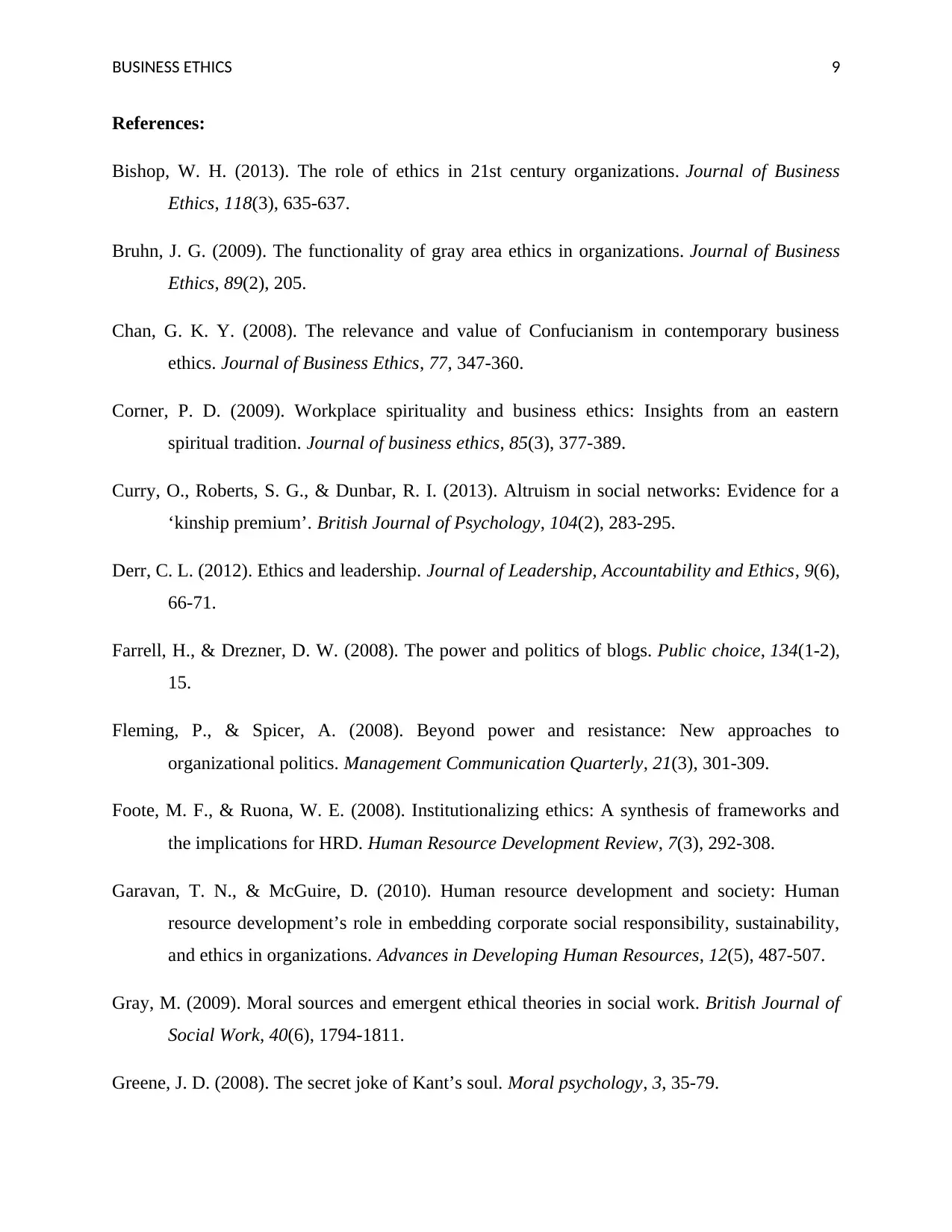
BUSINESS ETHICS 9
References:
Bishop, W. H. (2013). The role of ethics in 21st century organizations. Journal of Business
Ethics, 118(3), 635-637.
Bruhn, J. G. (2009). The functionality of gray area ethics in organizations. Journal of Business
Ethics, 89(2), 205.
Chan, G. K. Y. (2008). The relevance and value of Confucianism in contemporary business
ethics. Journal of Business Ethics, 77, 347-360.
Corner, P. D. (2009). Workplace spirituality and business ethics: Insights from an eastern
spiritual tradition. Journal of business ethics, 85(3), 377-389.
Curry, O., Roberts, S. G., & Dunbar, R. I. (2013). Altruism in social networks: Evidence for a
‘kinship premium’. British Journal of Psychology, 104(2), 283-295.
Derr, C. L. (2012). Ethics and leadership. Journal of Leadership, Accountability and Ethics, 9(6),
66-71.
Farrell, H., & Drezner, D. W. (2008). The power and politics of blogs. Public choice, 134(1-2),
15.
Fleming, P., & Spicer, A. (2008). Beyond power and resistance: New approaches to
organizational politics. Management Communication Quarterly, 21(3), 301-309.
Foote, M. F., & Ruona, W. E. (2008). Institutionalizing ethics: A synthesis of frameworks and
the implications for HRD. Human Resource Development Review, 7(3), 292-308.
Garavan, T. N., & McGuire, D. (2010). Human resource development and society: Human
resource development’s role in embedding corporate social responsibility, sustainability,
and ethics in organizations. Advances in Developing Human Resources, 12(5), 487-507.
Gray, M. (2009). Moral sources and emergent ethical theories in social work. British Journal of
Social Work, 40(6), 1794-1811.
Greene, J. D. (2008). The secret joke of Kant’s soul. Moral psychology, 3, 35-79.
References:
Bishop, W. H. (2013). The role of ethics in 21st century organizations. Journal of Business
Ethics, 118(3), 635-637.
Bruhn, J. G. (2009). The functionality of gray area ethics in organizations. Journal of Business
Ethics, 89(2), 205.
Chan, G. K. Y. (2008). The relevance and value of Confucianism in contemporary business
ethics. Journal of Business Ethics, 77, 347-360.
Corner, P. D. (2009). Workplace spirituality and business ethics: Insights from an eastern
spiritual tradition. Journal of business ethics, 85(3), 377-389.
Curry, O., Roberts, S. G., & Dunbar, R. I. (2013). Altruism in social networks: Evidence for a
‘kinship premium’. British Journal of Psychology, 104(2), 283-295.
Derr, C. L. (2012). Ethics and leadership. Journal of Leadership, Accountability and Ethics, 9(6),
66-71.
Farrell, H., & Drezner, D. W. (2008). The power and politics of blogs. Public choice, 134(1-2),
15.
Fleming, P., & Spicer, A. (2008). Beyond power and resistance: New approaches to
organizational politics. Management Communication Quarterly, 21(3), 301-309.
Foote, M. F., & Ruona, W. E. (2008). Institutionalizing ethics: A synthesis of frameworks and
the implications for HRD. Human Resource Development Review, 7(3), 292-308.
Garavan, T. N., & McGuire, D. (2010). Human resource development and society: Human
resource development’s role in embedding corporate social responsibility, sustainability,
and ethics in organizations. Advances in Developing Human Resources, 12(5), 487-507.
Gray, M. (2009). Moral sources and emergent ethical theories in social work. British Journal of
Social Work, 40(6), 1794-1811.
Greene, J. D. (2008). The secret joke of Kant’s soul. Moral psychology, 3, 35-79.
Paraphrase This Document
Need a fresh take? Get an instant paraphrase of this document with our AI Paraphraser
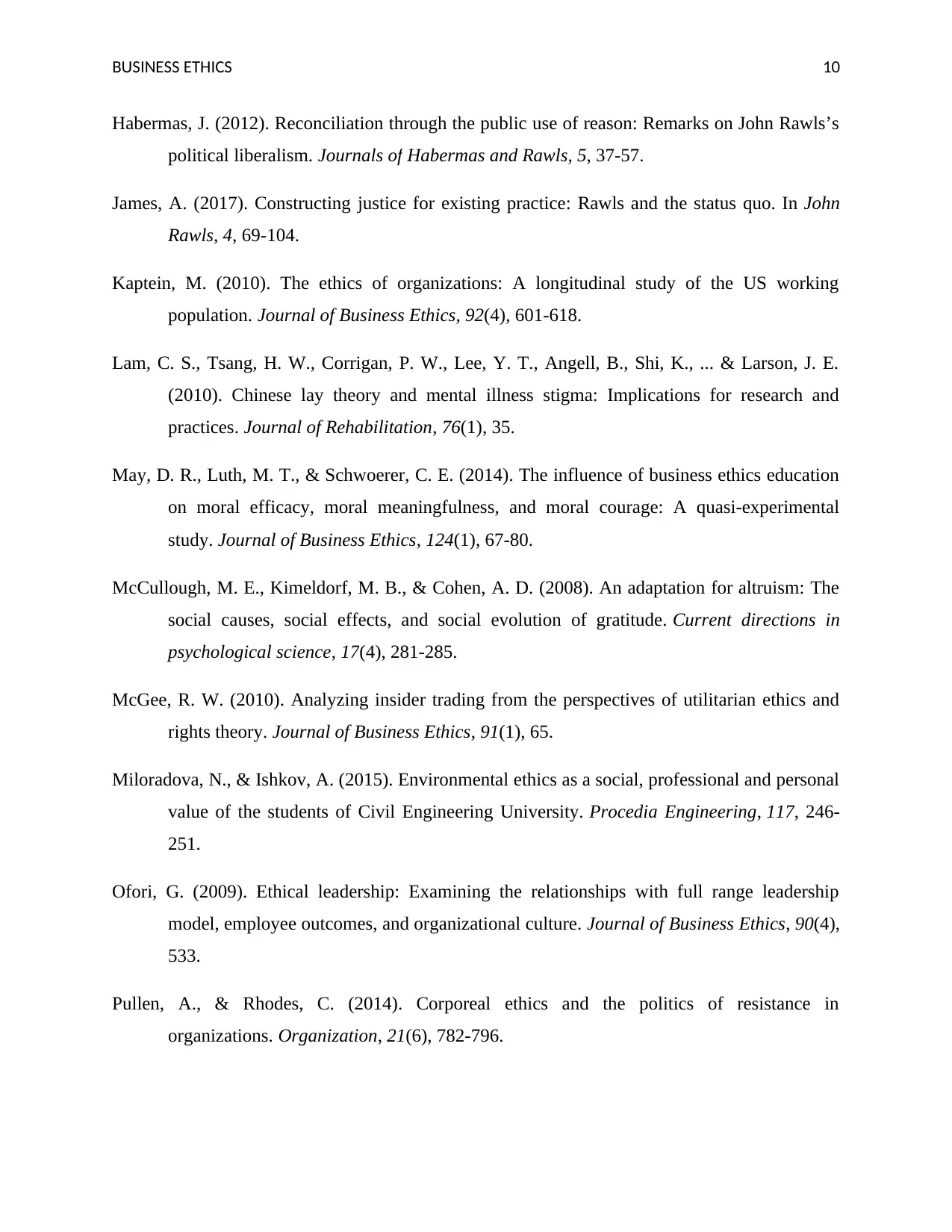
BUSINESS ETHICS 10
Habermas, J. (2012). Reconciliation through the public use of reason: Remarks on John Rawls’s
political liberalism. Journals of Habermas and Rawls, 5, 37-57.
James, A. (2017). Constructing justice for existing practice: Rawls and the status quo. In John
Rawls, 4, 69-104.
Kaptein, M. (2010). The ethics of organizations: A longitudinal study of the US working
population. Journal of Business Ethics, 92(4), 601-618.
Lam, C. S., Tsang, H. W., Corrigan, P. W., Lee, Y. T., Angell, B., Shi, K., ... & Larson, J. E.
(2010). Chinese lay theory and mental illness stigma: Implications for research and
practices. Journal of Rehabilitation, 76(1), 35.
May, D. R., Luth, M. T., & Schwoerer, C. E. (2014). The influence of business ethics education
on moral efficacy, moral meaningfulness, and moral courage: A quasi-experimental
study. Journal of Business Ethics, 124(1), 67-80.
McCullough, M. E., Kimeldorf, M. B., & Cohen, A. D. (2008). An adaptation for altruism: The
social causes, social effects, and social evolution of gratitude. Current directions in
psychological science, 17(4), 281-285.
McGee, R. W. (2010). Analyzing insider trading from the perspectives of utilitarian ethics and
rights theory. Journal of Business Ethics, 91(1), 65.
Miloradova, N., & Ishkov, A. (2015). Environmental ethics as a social, professional and personal
value of the students of Civil Engineering University. Procedia Engineering, 117, 246-
251.
Ofori, G. (2009). Ethical leadership: Examining the relationships with full range leadership
model, employee outcomes, and organizational culture. Journal of Business Ethics, 90(4),
533.
Pullen, A., & Rhodes, C. (2014). Corporeal ethics and the politics of resistance in
organizations. Organization, 21(6), 782-796.
Habermas, J. (2012). Reconciliation through the public use of reason: Remarks on John Rawls’s
political liberalism. Journals of Habermas and Rawls, 5, 37-57.
James, A. (2017). Constructing justice for existing practice: Rawls and the status quo. In John
Rawls, 4, 69-104.
Kaptein, M. (2010). The ethics of organizations: A longitudinal study of the US working
population. Journal of Business Ethics, 92(4), 601-618.
Lam, C. S., Tsang, H. W., Corrigan, P. W., Lee, Y. T., Angell, B., Shi, K., ... & Larson, J. E.
(2010). Chinese lay theory and mental illness stigma: Implications for research and
practices. Journal of Rehabilitation, 76(1), 35.
May, D. R., Luth, M. T., & Schwoerer, C. E. (2014). The influence of business ethics education
on moral efficacy, moral meaningfulness, and moral courage: A quasi-experimental
study. Journal of Business Ethics, 124(1), 67-80.
McCullough, M. E., Kimeldorf, M. B., & Cohen, A. D. (2008). An adaptation for altruism: The
social causes, social effects, and social evolution of gratitude. Current directions in
psychological science, 17(4), 281-285.
McGee, R. W. (2010). Analyzing insider trading from the perspectives of utilitarian ethics and
rights theory. Journal of Business Ethics, 91(1), 65.
Miloradova, N., & Ishkov, A. (2015). Environmental ethics as a social, professional and personal
value of the students of Civil Engineering University. Procedia Engineering, 117, 246-
251.
Ofori, G. (2009). Ethical leadership: Examining the relationships with full range leadership
model, employee outcomes, and organizational culture. Journal of Business Ethics, 90(4),
533.
Pullen, A., & Rhodes, C. (2014). Corporeal ethics and the politics of resistance in
organizations. Organization, 21(6), 782-796.
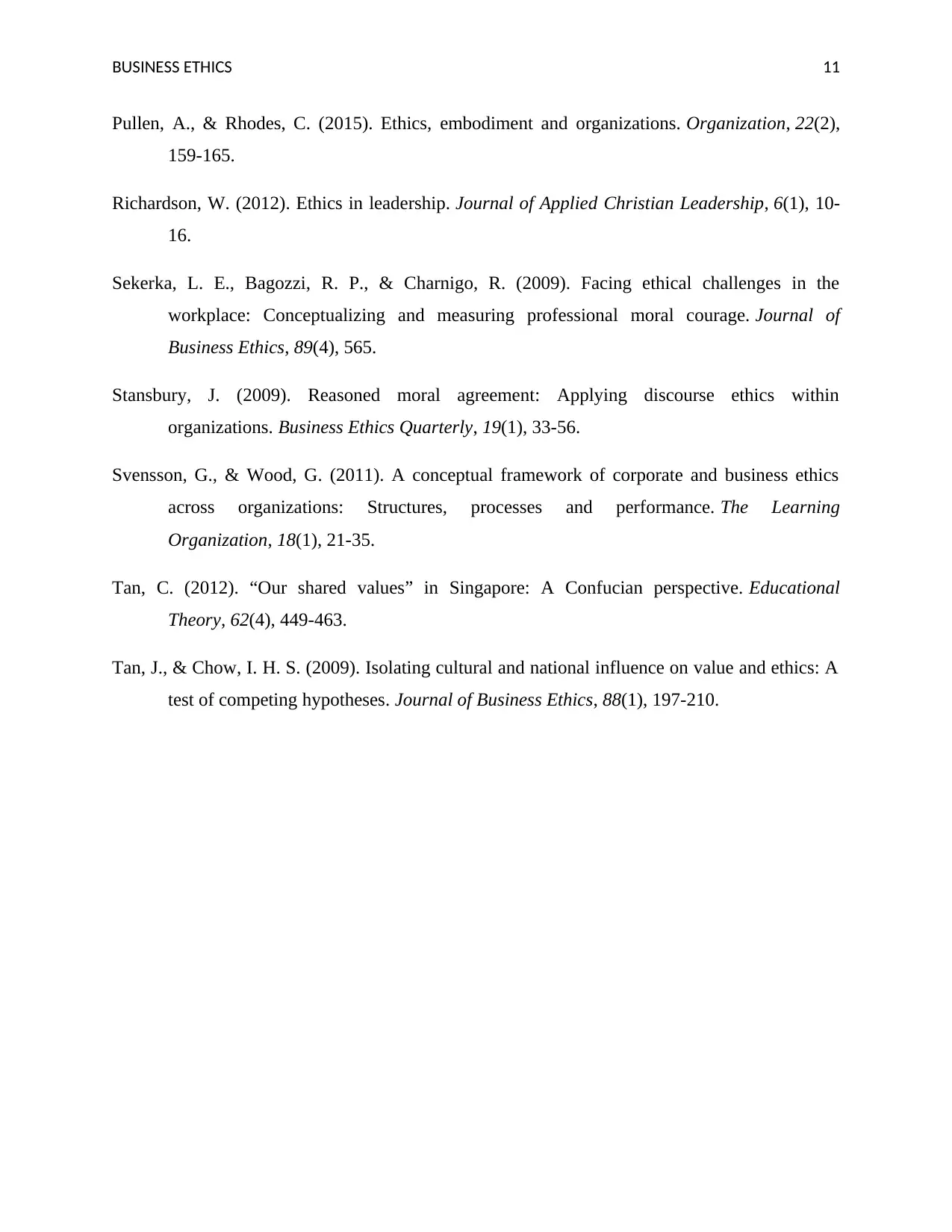
BUSINESS ETHICS 11
Pullen, A., & Rhodes, C. (2015). Ethics, embodiment and organizations. Organization, 22(2),
159-165.
Richardson, W. (2012). Ethics in leadership. Journal of Applied Christian Leadership, 6(1), 10-
16.
Sekerka, L. E., Bagozzi, R. P., & Charnigo, R. (2009). Facing ethical challenges in the
workplace: Conceptualizing and measuring professional moral courage. Journal of
Business Ethics, 89(4), 565.
Stansbury, J. (2009). Reasoned moral agreement: Applying discourse ethics within
organizations. Business Ethics Quarterly, 19(1), 33-56.
Svensson, G., & Wood, G. (2011). A conceptual framework of corporate and business ethics
across organizations: Structures, processes and performance. The Learning
Organization, 18(1), 21-35.
Tan, C. (2012). “Our shared values” in Singapore: A Confucian perspective. Educational
Theory, 62(4), 449-463.
Tan, J., & Chow, I. H. S. (2009). Isolating cultural and national influence on value and ethics: A
test of competing hypotheses. Journal of Business Ethics, 88(1), 197-210.
Pullen, A., & Rhodes, C. (2015). Ethics, embodiment and organizations. Organization, 22(2),
159-165.
Richardson, W. (2012). Ethics in leadership. Journal of Applied Christian Leadership, 6(1), 10-
16.
Sekerka, L. E., Bagozzi, R. P., & Charnigo, R. (2009). Facing ethical challenges in the
workplace: Conceptualizing and measuring professional moral courage. Journal of
Business Ethics, 89(4), 565.
Stansbury, J. (2009). Reasoned moral agreement: Applying discourse ethics within
organizations. Business Ethics Quarterly, 19(1), 33-56.
Svensson, G., & Wood, G. (2011). A conceptual framework of corporate and business ethics
across organizations: Structures, processes and performance. The Learning
Organization, 18(1), 21-35.
Tan, C. (2012). “Our shared values” in Singapore: A Confucian perspective. Educational
Theory, 62(4), 449-463.
Tan, J., & Chow, I. H. S. (2009). Isolating cultural and national influence on value and ethics: A
test of competing hypotheses. Journal of Business Ethics, 88(1), 197-210.
⊘ This is a preview!⊘
Do you want full access?
Subscribe today to unlock all pages.

Trusted by 1+ million students worldwide
1 out of 12
Related Documents
Your All-in-One AI-Powered Toolkit for Academic Success.
+13062052269
info@desklib.com
Available 24*7 on WhatsApp / Email
![[object Object]](/_next/static/media/star-bottom.7253800d.svg)
Unlock your academic potential
Copyright © 2020–2026 A2Z Services. All Rights Reserved. Developed and managed by ZUCOL.





